Introduction
Frustrated by low customer engagement and clunky sales processes?
Feeling like your customers are ghosts? Inbox crickets and flat sales numbers got you down?
It's time to ditch the old strategies and connect with your customers where they hang out – their favorite app, WhatsApp!
This guide covers how to turn WhatsApp into a customer magnet. It offers 11 tips to boost engagement, skyrocket sales, and make communication a breeze.
Think personalized messages, automated replies, cool multimedia content, even AI chatbots! All this to transform your WhatsApp into a powerful customer service tool.
But wait, there's more! WhatsApp CRM integration can also streamline your internal communication. Managing teams, tracking performance, and analyzing data just got easier.
Get ready to see the power of WhatsApp CRM integration and take your business to the next level. This guide is your roadmap to a more connected, engaged, and prosperous future. Let's dive in!
What is WhatsApp CRM Integration?
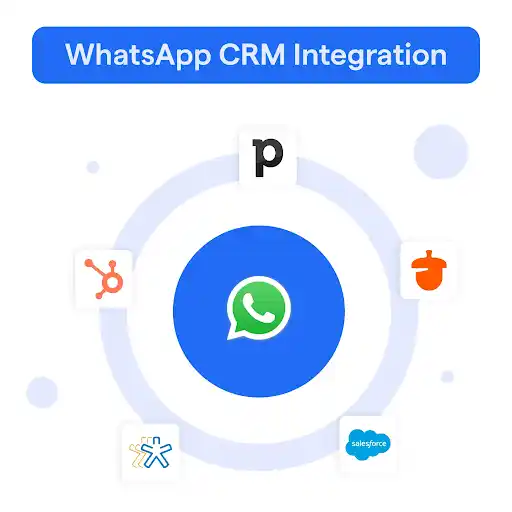
WhatsApp CRM Integration refers to the process of connecting your Customer Relationship Management (CRM) system with WhatsApp, a popular messaging platform.
This integration allows businesses to manage and respond to customer inquiries, send notifications, market products or services.
It also provides customer support directly through WhatsApp, all from within their CRM system.
Benefits of WhatsApp CRM Integration
The benefits of WhatsApp CRM Integration include:
- Centralized Communication: All customer interactions via WhatsApp can be managed from a single platform, making it easier for businesses to track and respond to customer inquiries.
- Personalized Communication: Businesses can use customer data from their CRM to personalize their communication on WhatsApp, improving customer engagement and satisfaction.
- Automation: Certain tasks, such as sending notifications or responses to frequently asked questions, can be automated, saving time and resources.
- Improved Customer Support: With WhatsApp's real-time messaging capabilities, businesses can provide quick and efficient customer support.
- Data Synchronization: Customer data is automatically updated in the CRM based on interactions on WhatsApp. Thus ensuring that businesses always have the most up-to-date information.
Why Use WhatsApp CRM Integration?
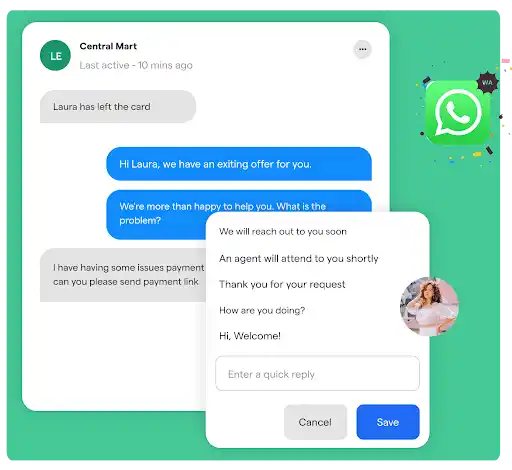
In this section, you’ll find the reasons for using WhatsApp CRM integration.
Improved Customer Engagement
Today's marketplace is ultra-competitive, making customer engagement more important than ever. Using WhatsApp CRM enables businesses to connect with their customers on a platform they use daily.
This familiarity breeds a higher engagement rate, as customers are likely to interact with messages sent via WhatsApp than through traditional channels like email.
Increased Sales and Conversions
WhatsApp CRM integration doesn't just keep your customers engaged; it also significantly boosts your sales and conversions.
With features like product catalogs and direct payment links, WhatsApp makes the buying process seamless for customers. This ease of purchase and personalized customer service can effectively drive sales numbers up.
Streamlined Communication and Management
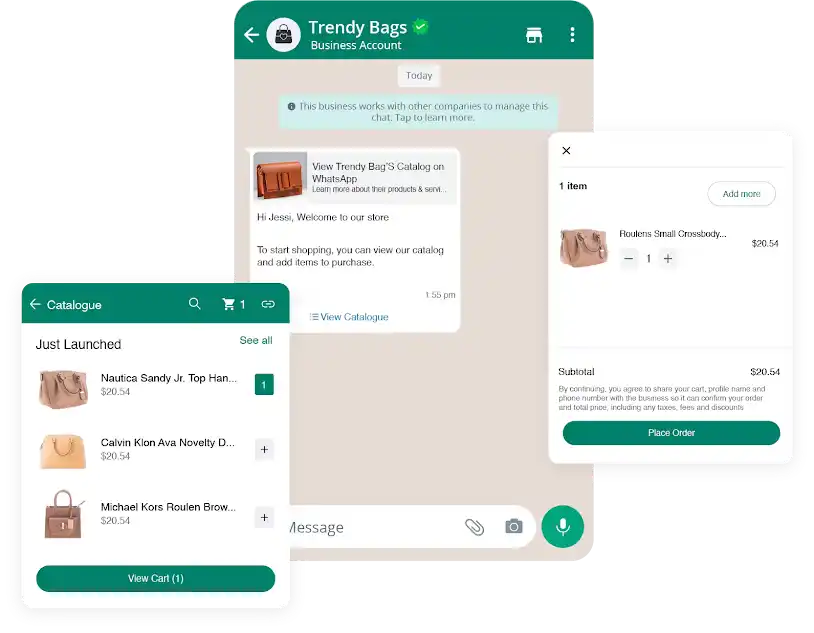
Managing customer interactions across multiple platforms can be chaotic. WhatsApp CRM integration streamlines this process by centralizing communication.
Businesses can track customer interactions, manage inquiries, and follow up on leads all in one place, making the customer management process smoother and more efficient.
Enhanced Customer Support
WhatsApp CRM integration can significantly improve your customer support services.
WhatsApp enables businesses to provide real-time assistance to their customers. This immediate support can help resolve customer issues quickly and efficiently, increasing customer satisfaction.
With WhatsApp, businesses can send text messages, images, videos, and documents. This multimedia support can be particularly useful for troubleshooting or explaining complex issues.
Suggested Reading:
7 Innovative Ways to Use WhatsApp CRM for Business Growth
Cost-Effective Solution
WhatsApp CRM integration can be a cost-effective solution for businesses.
WhatsApp uses the internet to send messages. Thus making it a cheaper alternative to traditional SMS, especially for businesses that send a high volume of messages.
As WhatsApp is a widely used platform, businesses don't need to invest in additional software or convince customers to use a new platform.
Data-Driven Insights
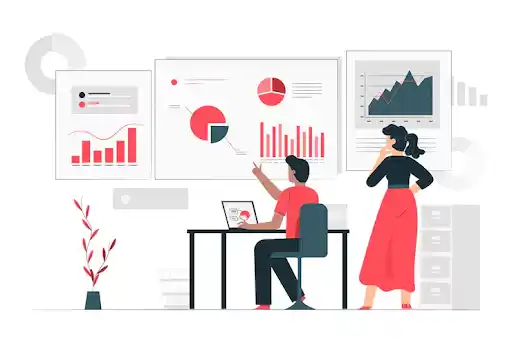
WhatsApp CRM integration can provide valuable insights to help businesses make data-driven decisions.
By tracking customer interactions on WhatsApp, businesses can gain insights into customer behavior, preferences, and needs.
WhatsApp CRM integration can provide metrics such as message open rates, response times, and conversion rates. Thus helping businesses measure and improve their performance.
11 Tips for Maximizing WhatsApp CRM Effectiveness
This section will cover 11 hacks to turn your WhatsApp CRM into a customer-winning machine. Let's see how!
Tip 1: Craft a Compelling WhatsApp Business Profile
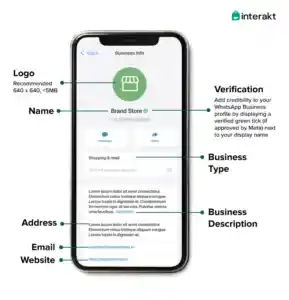
To craft a compelling WhatsApp Business profile, follow these:
- Profile picture and business description: Your profile picture should be your business logo or something immediately recognizable as your brand.
The business description area should succinctly state what your business does, catering to the needs and interests of your potential customers.
- Highlight your unique selling points: Include what sets your business apart. This could be your unbeatable prices, exceptional customer service, or unique products or services.
- Set up quick replies: Quick replies save time by allowing you to respond instantly to common questions. This feature ensures customers aren't kept waiting, enhancing their overall experience with your brand.
Tip 2: Utilize WhatsApp Groups for Targeted Communication
Next tip is to utilize WhatsApp groups for targeted communication:
- Create groups for different customer segments: This allows for more personalized and relevant communication. For example, you might have separate groups for VIP, repeat, and new customers.
- Share relevant content, promotions, and updates: Tailor your messages to each group’s interests and needs. This personal touch can make customers feel valued and increase engagement.
- Establish clear guidelines: Set rules for group interactions to maintain order and prevent spam. This encourages constructive discussions and keeps the group focused on its purpose.
Tip 3: Broadcast Messages for Important Announcements and Updates
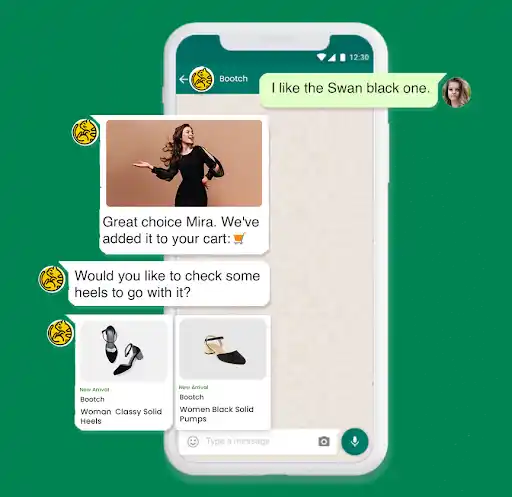
Maximize reach and engagement by strategically segmenting your audience and scheduling broadcasts during optimal times.
- Segment your audience: Send messages that resonate with specific demographics or interests. Personalized content has a higher chance of engaging customers and driving action.
- Schedule broadcasts for optimal delivery times: Time your messages to reach your audience when they are most likely to see and interact with them, such as in the late afternoon or early evening.
- Craft engaging messages: Write your broadcast messages in a way that grabs attention and provides clear value to the recipient. Avoid generic content that could lead to your message being ignored.
Suggested Reading:
Automate Your Business with WhatsApp CRM Integrated Chatbots
Tip 4: Personalize Your Communication with Individual Chat Conversations
Enhance customer experience and build stronger relationships by using customer names, tailoring your responses, and leveraging emojis judiciously.
- Use customer names: This slight touch can significantly enhance the customer’s perception of your brand, making the conversation more personal and genuine.
- Tailor your responses: Show that you’re listening by addressing the customer’s situation, question, or concern. Personalized responses can significantly improve customer satisfaction and loyalty.
- Leverage emojis sparingly: Emojis can make your brand seem more approachable and friendly, but they should be used judiciously to maintain a professional tone.
Tip 5: Respond to Customer Inquiries Promptly
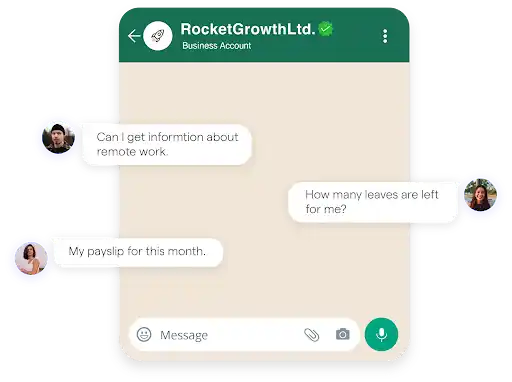
Foster customer loyalty and trust by setting clear response time expectations, aiming for a fast initial reply, and showing attentiveness to their needs.
- Set clear expectations for response times: Let customers know how soon they can expect a reply. This transparency can reduce frustration and set a realistic timeline.
- Aim for a fast initial response: Acknowledge the inquiry even if you can't provide a complete solution immediately. This shows you’re attentive to your customers' needs.
- Quick response shows you care: Timely communication signals to customers that their concerns are important to your business, fostering a more profound sense of loyalty and trust.
Tip 6: Utilize Labels to Organize Your Contacts
Create a labeling system, leverage labels for targeted broadcasts, and regularly review and update your labels to improve communication relevance and efficiency.
- Create a labeling system. This will help you quickly identify and segment your contacts based on specific criteria, such as purchase behavior or interest in certain products.
- Leverage labels for targeted broadcasts: Send out messages that are specially crafted for segments defined by your labels, enhancing the relevance and effectiveness of your communications.
- Regularly review and update labels: As your business evolves and you gain more insights into your customers, continuously refine your labeling system to ensure it remains an effective organizational tool.
Suggested Reading:
8 WhatsApp CRM Integrations That Can Help Grow Business
Tip 7: Integrate WhatsApp CRM with Existing CRM System (if applicable)
Integrate your WhatsApp CRM with your existing CRM system for a seamless and holistic customer experience, like:
- Streamline data management: An integration allows for the seamless flow of information between WhatsApp and your existing CRM, eliminating manual data entry and reducing errors.
- Centralize customer interactions: A holistic view of each customer’s interactions across platforms can help tailor your communication and offers, leading to better customer service and increased sales.
- Avoid data silos and redundancy: Integration ensures all customer data is consolidated in one place, making it easier to analyze and act upon without the risk of overlooking important information.
Tip 8: Leverage WhatsApp Chatbots for 24/7 Support and Data Collection
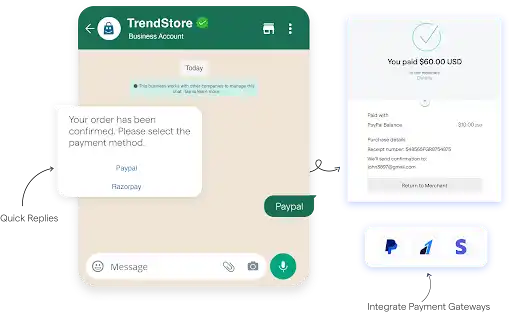
WhatsApp chatbot is a powerful tool that can help you automate and enhance your customer service. Here's how:
- Automate greeting messages: With WhatsApp chatbot like BotPenguin, you can set up your chatbot to send a warm, personalized welcome message as soon as customers initiate a chat. This immediate response sets a positive tone for the interaction and lets your customers know you're there for them.
- Handle frequently asked questions: WhatsApp chatbot allows you to program your chatbot to provide answers to common inquiries. This not only ensures instant support for your customers but also frees up your human agents to focus on more complex customer issues.
- Gather customer information systematically: BotPenguin, a WhatsApp chatbot, can help you use your chatbot to ask pre-determined questions. It also helps you profile and understand your customers' preferences and needs. This data can be invaluable for tailoring your services and improving customer satisfaction.
- Escalate complex queries to human agents: WhatsApp chatbot ensures that your chatbot can recognize when a query is too complex and seamlessly hand over the conversation to a live agent. This ensures that your customers always receive the help they need, even when it's beyond the capabilities of a chatbot.
With all the heavy work of chatbot development already done for you, move forward to setting up a top-notch WhatsApp AI chatbot for your business with features like:
Tip 9: Utilize Chat Analytics to Gain Customer Insights
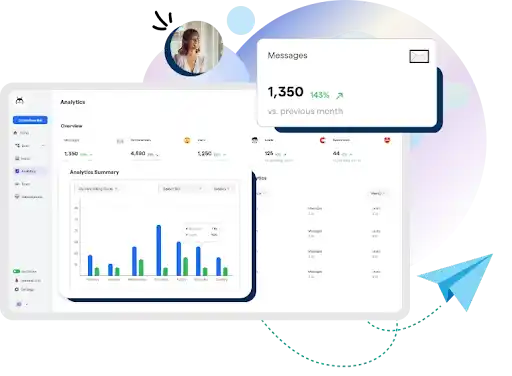
Optimize your customer service and support by monitoring chat volume, analyzing conversation sentiment, and tracking resolution rates and follow-up actions.
- Monitor chat volume and response times: Understanding these metrics helps you gauge your customer service efficiency and identify peak times for staffing purposes.
- Analyze conversation sentiment: Use sentiment analysis tools to gauge customer mood and satisfaction levels, providing valuable feedback on your service's effectiveness.
- Track resolution rates and follow-up actions: Knowing how quickly and effectively issues are resolved can help you improve processes and training.
Tip 10: Set up Automated Reminders and Follow-Ups
Customizing reminders for different needs, personalizing follow-up messages, and using automation for re-engagement can enhance customer experience and streamline processes.
- Customize reminders for different needs: For example, appointment reminders for services or payment reminders for outstanding invoices. Automated reminders ensure nothing gets missed.
- Personalize your follow-up messages: Send post-purchase follow-ups or check-ins after service completions to show that you value customer feedback and satisfaction.
- Use automation for re-engagement: Send messages to customers who haven't interacted with your business for a while, potentially reigniting their interest.
Tip 11: Regularly Evaluate and Update Your WhatsApp CRM Strategy
Ensure continuous improvement by reviewing performance metrics, soliciting and acting on customer feedback, and staying informed on WhatsApp updates to keep your strategy current and effective.
- Review performance metrics regularly: Examine the data to determine what's working well and needs improvement. Make data-driven decisions to refine your WhatsApp CRM approach.
- Solicit and act on customer feedback: Regularly ask for customer input regarding your WhatsApp service experience and make changes based on this valuable insight.
- Stay informed on WhatsApp updates: Keep your strategy and tools current by staying up-to-date with the latest WhatsApp features and integrating them into your CRM practices when relevant.
Conclusion
Implementing the 11 potent strategies outlined can significantly transform your WhatsApp platform into a dynamic customer magnet. These encompass personalized greetings, automated reminders, and other engagement-boosting tips that can substantially elevate your sales and optimize communication.
Seize the opportunity to enhance your customer service experience. The time to act is now!
Here's where BotPenguin comes in.
BotPenguin is a user-friendly chatbot builder designed explicitly for WhatsApp. It helps you automate tasks, personalize interactions, and gain valuable customer insights – all without the coding headaches.
BotPenguin offers automated welcome messages and FAQs, freeing up your team's time. Segment your audience for targeted broadcasts, maximizing impact. Track key metrics to gain valuable insights and improve your strategy.
With BotPenguin, streamline communication, foster customer connections, and optimize your WhatsApp marketing efforts.
Stop letting crickets fill your inbox and watch your sales soar. Try BotPenguin today and unlock the full potential of WhatsApp CRM!
Frequently Asked Questions (FAQs)
How can I use WhatsApp more effectively?
Start using features like voice notes for quick communication, set reminders with pinned chats, and leverage status updates to share business updates.
How can I maximize my WhatsApp marketing?
Effective WhatsApp marketing involves sending targeted broadcast messages, engaging in one-on-one customer interaction, and maintaining a professional business profile.
How can I use WhatsApp as CRM?
For WhatsApp CRM, automated replies for common queries are used, a systematic customer database is maintained, 24/7 support is provided, and regular follow-up with customers is provided.
How do I optimize my WhatsApp business account?
Keep your business profile updated, use labels to categorize chats, set quick replies for frequently asked questions, and enable business hours for automatic replies.
What is the criticism of WhatsApp?
WhatsApp has faced criticism around data privacy concerns, its handling of misinformation, and occasional technical hitches leading to service interruptions.


